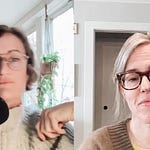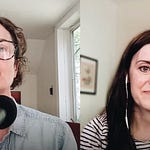This is the SECOND part of the series After Quit Like a Woman: Exploring how neurodivergence, hormones, and cPTSD reshape recovery I talked about here.
Part 3, Can you moderate alcohol?, is here.
Part 4, We got sober. Then we got our ADHD diagnosis. This is what happened next, is here.
Par 5, Does recovery re-traumatize fawners? is here
Part 6, The long game of boundaries, is here
What’s a relapse?
SHOW NOTES
What if the framework we use to understand addiction is actually making it harder for people to heal? Carrie Wilkens has spent over two decades building an alternative at the Center for Motivation and Change, one that starts with a radical premise: behaviors make sense. Instead of diagnosing and demanding abstinence, she asks what the substance is doing for someone, what pain it’s masking, what regulation it’s providing. This conversation explores why the word “relapse” itself is a trap, how families inadvertently push substance use underground, and why compassion—not control—is the foundation for real change. We talk about the complexity that gets flattened by disease model thinking, the scapegoating that keeps us from examining collective suffering, and what it actually looks like to create space for curiosity rather than judgment. It’s a conversation about unlearning fundamentalism, understanding co-occurring struggles like ADHD and trauma, and recognizing that people using substances aren’t morally corrupt—they’re in pain.
SHOW NOTES
The founding principles of CMC and how evidence-based treatment differs from traditional abstinence-only models; why “behaviors make sense” reframes the entire treatment approach; how substance use is almost always secondary to underlying issues like trauma, ADHD, anxiety, and depression; why moderation isn’t necessarily harder than abstinence; the problem with the word “relapse” and reframing it as returning to an old behavior; creating environments where people can talk openly without shame; the role of families and why labels like “codependent” miss the complexity; balancing structure and flexibility across different recovery stages; the unique cultural stigma around substance use; why people with ADHD and neurodivergence are at higher risk; the importance of self-awareness and curiosity in behavior change; how “in recovery” identity can be both helpful and limiting; practical communication strategies through CRAFT and Invitation to Change; the connection between suffering and substance use; natural recovery statistics; CMC’s nonprofit arm empowering families; how societal scapegoating of addiction prevents examining collective failures around trauma and systemic issues.
ABOUT CARRIE
Carrie Wilkens, PsyD, is a clinical psychologist and Co-President/CEO of the CMC:Foundation for Change, a nonprofit improving dissemination of evidence-based addiction treatment. She co-founded the Center for Motivation and Change, which operates outpatient centers in NYC, Long Island, DC, San Diego, and a residential program in the Berkshires. Dr. Wilkens co-authored the award-winning Beyond Addiction: How Science and Kindness Help People Change and its companion workbook, both grounded in CRAFT (Community Reinforcement and Family Training). Her Invitation to Change approach empowers families to stay engaged and support positive change without requiring abstinence. She’s been featured on CBS Morning Show, NPR, Ten Percent Happier, and HBO’s Risky Drinking documentary. Her work challenges traditional treatment by treating substance use as learned behavior connected to underlying struggles like trauma and ADHD, prioritizing curiosity and compassion over judgment.
CREDITS
Original music by Adam Day
Sound engineering, editor: Adam Day, adamdayphotography.com
Producers: Holly Whitaker, Adam Day
Original art by Misha Handschumacher, cmisha.com














